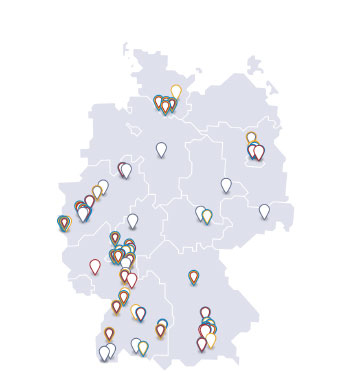Praxisbasierte Fall-Kontrollstudie zur Beurteilung der Impfeffektivität einer Varizellen-Impfung bei Kindern
Titel der Studie/Acronym
Praxisbasierte Fall-Kontrollstudie zur Beurteilung der Impfeffektivität einer Varizellen-Impfung bei Kindern
Zielsetzung/Fragestellung
Impfeffektivität der Varizellen-Impfung
Indikation
- Windpocken
Wirkstoff
- Varilrix (deutsch)
- verschiedene Wirkstoffe (deutsch)
Handelsname(n)
Varilrix und andere zugelassene Varizellen-Impfstoffe
Studie von Zulassungsbehörde gefordert oder von G-BA oder anderer Institution empfohlen
Nein
Studientyp
Vergleichende Untersuchung
Art der Studienzentren
Praxis/niedergelassener Bereich
Untersuchung wird nur in D durchgeführt
Ja
primäre Zielgröße(n)
Occurrence of PCR-confirmed varicella cases in children administered one dose of Varilrix (≥ 28 days after receipt of vaccine) or in unvaccinated children
sekundäre Zielgröße(n)
• Occurrence of PCR-confirmed varicella cases in children administered one dose of commercially-available varicella vaccine (≥ 28 days after receipt of vaccine) or in unvaccinated children
• Occurrence of PCR-confirmed severe varicella cases in children administered one dose of Varilrix™ (≥ 28 days after receipt of vaccine) or in unvaccinated children
• Occurrence of PCR-confirmed severe varicella cases in children administered one dose of commercially-available varicella vaccine (≥ 28 days after receipt of vaccine)
or in unvaccinated children
• Occurrence of clinical varicella cases in children administered one dose of commercially-available varicella vaccine (≥ 28 days after receipt of vaccine) or in
unvaccinated children
• Occurrence of clinical varicella cases in children administered two doses of commercially-available varicella vaccine (≥ 28 days after receipt of the second dose
of vaccine) or in unvaccinated children
Angaben zur Fallzahlbegründung
Die geplante Patientenzahl für die Untersuchung betrug je 400 - 600 Fälle und Kontrollen. Die tatsächliche Patientenzahl für die Untersuchung betrug 510 Fälle und 500 Kontrollen. Vaccination coverage has been assumed to be 25%, with vaccine effectiveness (VE) assumed to be 80%. Under these assumptions, in order to provide 80% power that the lower limit of the 95% confidence interval of VE would be above 50%, 315 children with PCR-confirmed varicella (and 315 age-matched controls) would be required to compute the effectiveness of one dose of varicella vaccine under conditions of routine use.
To evaluate the primary objective, the market share of Varilrix? needs to be taken into account (estimated at 60%). The analysis will include only informative pairs (i.e. all pairs for which the case and control are either not vaccinated or have received only one dose of Varilrix?). A total of 360 children with PCR-confirmed varicella (and 360 age-matched controls) will therefore be required.
It has been estimated that 15% of the PCR-confirmed cases may need to be excluded from analysis (due to the absence of an age-matched control or to vaccination within the 28-day window); the study will therefore need to include at least 420 children with PCRconfirmed varicella.
An initial number of pediatric practices in Munich and the Munich area will participate.
If enrolment is significantly less than foreseen, additional practices may be recruited including potentially elsewhere in Germany beyond the Munich area. Forty varicella cases are likely to occur per practice per year, based on seasonal variation of an average monthly incidence of 1-7 cases (from BaVariPro surveillance, personal communication J. Liese). Assuming that approximately 50% of the parents/guardians give consent for their child to participate, 400-600 clinical cases could be accrued into the study over a one year period.
Geplante Anzahl vorgesehener Studienzentren: für die Untersuchung insgesamt
40
Geplante Anzahl vorgesehener Studienzentren: Anzahl in Deutschland
40
Anzahl Studienzentren: für die Untersuchung insgesamt
35
Anzahl Studienzentren: Anzahl in Deutschland
35
Geplante Patientenzahl: für die Untersuchung insgesamt
1000
Geplante Patientenzahl: Anzahl in Deutschland
1000
Patientenzahl: für die Untersuchung insgesamt
1010
Patientenzahl: Anzahl in Deutschland
1010
Geplante Patientenzahl pro Praxis/Zentrum
20
Beginn der Studie
08.02.2008
Geplante Beobachtungsdauer je Patient
2 Wochen
Geplante Dauer der Studie
18 Monate
Studiennummer
BIO109737
Kontaktperson
Fritsch, Alexandra
Project Leader Clinical Research
GlaxoSmithKline GmbH & Co. KG
Theresienhöhe 11
80339 München
Deutschland
Telefon: 089-36044 8549
Unternehmen
GlaxoSmithKline GmbH & Co. KG
Prinzregentenplatz 9
81675 München
Deutschland
Stand der Information
28.07.2015
Status der Studie
Studie bereits abgeschlossen



